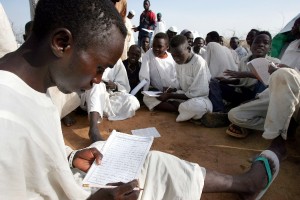

Follow us on:  
|


Dafur Refugees in Chad. [Getty Images]
Eltigani Seisi who heads the Darfur Regional Authority set up to implement the Doha agreement told AFP on Sunday.
“If the international community refrains from providing support then how could we be able to stabilise the situation on the ground?” Seisi said.
“And how could the people of Darfur have dividends for peace?”
The complex conflict between armed rebel groups and government-backed militia in Darfur began in 2003.
The UN estimates at least 300,000 people died but the government puts the toll at 10,000.
The authorities have appealed for international support.
Last week, Ali Mahmoud, Sudan’s finance minister told Reuters that China had granted the country a $1.5bn loan at a time when Sudan is trying to stop a slide in its currency.
China also gives extensive aid to Sudan, including for the Darfur region.
Today, about 1.4 million people remain in camps in the Darfur region, according to UN figures.
Seisi was speaking ahead of an April 7-8 donors’ conference in Qatar.
Analysts are sceptical that major funds will be forthcoming.
Sectarian violence in Darfur has come down from its peak after civil war broke out in 2003 but there are still clashes between government forces, rebels and rival ethnic groups.
Most Western firms shun the African country due to a US trade embargo.
UN Secretary General Ban Ki-moon reported in January that a 2011 armistice deal, signed in Doha, has yet to bring “concrete peace dividends” for Darfur’s neediest.
“I am increasingly concerned that this lack of meaningful progress will erode the confidence of the people of Darfur and the international community in the Doha document,” Ban said.
The International Criminal Court has issued arrest warrants for Sudan’s President Omar Hassan al-Bashir and other senior officials on charges of genocide and war crimes in Darfur – they deny this and refuse to recognise the court.
Source: Agencies